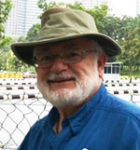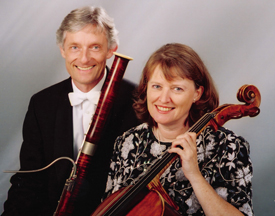

RICHMOND, California — Rebecca Rust, born in Oakland and raised in Richmond, California, and Friedrich Edelmann from Kaiserslautern in southwest Germany, met in 1971 at a Jeunesses Musicales World Orchestra program in a village near Brussels, Belgium. Rebecca played the violoncello and Friedrich the bassoon. They have been married for over 40 years and live in the village of Rhodt in the wine region in southwestern Germany. They have had stellar teachers and performed under the baton of internationally recognized conductors, almost household names, such as Karel Ancerl, Daniel Barenboim, Carlo Maria Giulini, Erich Leinsdorf, Lorin Maazel, and Kurt Masur.
The German-American couple are currently on a West Coast tour and will help observe the 75th anniversary of the Liberation of Auschwitz at the Los Angeles Holocaust Museum on January 27.
They first performed at the Los Angeles Holocaust Museum in 2019. This year, in observance of the 75th anniversary of the liberation of Auschwitz concentration camp they will premiere the first public performance of a piece composed for them by Laurence Sherr of Kennesaw State University in Georgia. Sherr has a specialty in music of the Holocaust. The program will be cosponsored by the German and Italian Counsels of Los Angeles. Audiences should be prepared for remarkable music, by a remarkable globe-trotting couple.
I have seen them perform in Berkeley at a senior citizen residence, at the Women’s Club accompanied by a book reading on the Holocaust, and two intimate house concerts. House concerts seat 20 to 40 guests who pay $20 for admission. They have performed in concert halls and auditoriums, on radio and television, recorded 15 CDs, and appear on YouTube.
Their repertoire for the 2020 American tour included works by Tomaso Albinoni, Johann Sebastian Bach, Samuel Barber, Ludwig van Beethoven, Luigi Boccherini, Johannes Brahms, Anton Dvorak, Gabriel Fauré, Arthur Frackenpohl, Francois Francoeur, Hans Gál, Michail Glinka, Gioachino Rossini, Anton Rubinstein, Johann Paul Schiffelholz, Robert Schumann, Laurence Sherr, and Max Stern.
Several composers have composed works for Friedrich and Rebecca including Harald Genzmer, Jan Koetsier, Karl Michael Komma, Otmar Mácha, Jan Novák, Laurence Sherr, and Max Stern.
At a home in Berkeley they recently performed seven pieces. Rebecca is Jewish, Friedrich is not. They very often flavor their programs with Jewish themed music and Jewish composers. This evening they performed Beethoven’s adaptation of Georg Frideric Handel’s Judas Maccabees.
Because “See the conquering hero comes,” portends victory the music can be heard at Japanese sports stadiums. “Rejoice greatly, O Daughter of Zion” is standard repertoire at German Christmas programs.
Max Stern, Israeli composer wrote “Songs of Ascents” (“Shir Hamaalot”) for them in 2007.
Fifteen psalms (120-34) are presented in four movements: Awakening, processional, meditation (arrival at top of mountain), and recessional. The bassoon serves as the shofar, rams horn, and the cello substitute for the harp
In Germany the duo perform classical chamber music and use the name Moart-Duo, in Japan Facello and in the U.S. sometimes San Francisco Munich Duo, and other times they just use their two names.
They travel about three months out of the year performing in the United States, especially the West Coast where Rebecca has family and friends. Performance has also taken them to Austria, Belgium, China, Czech Republic, England, France, Israel, Italy, Japan (at least 25 locations), Korea, Morocco, Poland, Portugal, Singapore, Spain, Tunisia, and Venezuela, where Friedrich performed and taught while “Gustavo Dudamel was a baby.” The world tours have included corporate and government sponsorship such as Mercedes-Benz in Japan and the Ministry of Foreign Affairs of Germany. In 2015 they gave more than 70 concerts.
Friedrich served as Principal Bassoonist with the Munich Philharmonic Orchestra from 1977 to 2004. He wrote Memoirs of Seventeen Years as Principal Bassoonist under Principal Conductor Sergiu Celibidache, (2009), a Romanian. Translated from English into Japanese it sold 2,000 copies.
Both their instruments saw their prototype emerge in the 16th century. Friedrich’s Fagott-Bassoon was made in Wiesbaden in 1938 by the noted craftsman Wilhelm Heckel. Rebecca’s 1791 cello was made by William Forster, the British Royal cello maker. One of its prior owners was Prince Charles who studied cello. Although they have not played for Prince Charles they played for the old and new Emperor and Empress of Japan. These prized instruments receive royal treatment. The cello gets a full price seat, the bassoon does not cost extra. Rebecca practices the most, total for the duo is about about 25 hours a week plus the rehearsal time
They do not use a booking agent. The tour is 100% self-created, performance and rehearsal space, travel and lodging. For audience and housing they rely on word of mouth, a network of friends, and the graciousness of strangers who soon become friends.
*
Oliver Pollak, PhD, a professor emeritus of history at the University of Nebraska, Omaha, and a lawyer, is a correspondent now based in Richmond, California. He may be contacted via oliver.pollak@sdjewishworld.com